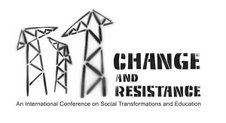Mälardalen university
Sharon Todd
Stockholm Institute of Education
One of the cornerstones of a democratic education is a basic notion of respect for others who hold different points of view from ourselves. Yet, within an increasingly divergent public discourse about values, rights, and equality, especially gender equality, democratic education needs to concern itself with practices that not only encourage respect, but that can negotiate through the very troubled relations that often afflict classrooms and schools. Models of how to encourage respect often centre on creating a conflict-free atmosphere through appeals to deliberation, dialogue, conversation, consensus, and/or a combination of these. Indeed, conflict is often perceived as not simply being counter-productive to dialogue and conversation, but as being indicative of communicative breakdown itself. In this way, conflict becomes the symptom of social ills through which recourse to some form of dialogue supposedly acts as the remedy. The idea of conflict has become so antithetical to democratic education that little has been written on the inevitability and importance of some kinds of conflict for legitimising the possibility of democracy itself.
The purpose of this paper is to explore the significance of cross-cultural conflict for democratic education and to propose an ethical orientation which seeks to make space for conflict as an integral part of learning democracy. The paper puts forth two ideas: a) that certain relations of conflict, particularly those identified by Chantal Mouffe (2005) as “agonistic relations,” are necessary for the very existence of democratic politics and can serve as starting points for reconsidering how schools situate themselves in relation to cross-cultural dilemmas; and b) that an ethical orientation to conflict requires the affirmation of the other as a form of hospitality through which democratic projects might be more fully realised.
Drawing on Chantal Mouffe (2005), Emmanuel Levinas (1969) and Jacques Derrida (1999), this paper discusses both the political and ethical dimensions of conflict in education. Specifically, Mouffe’s model of “agonistic relations,” which takes pluralism as a condition for politics, offers a unique perspective on how some forms of conflict might be reconceived as essential to democratic education. In wishing to extend her views, we build upon the notion of hospitality and the ethical relation to the other as expressed by Levinas and Derrida in order to highlight how agonistic relations demand a form of ethical response which lies beyond respect.
Through this investigation we seek not to provide a model of conflict resolution, but an ethical orientation to conflict that recognizes its centrality in the creation of a vibrant democratic engagement with difference. The place of the ethical is not in our view about a normative imperative of what we should do in order to reach consensus, but about how we live with the “endless betterment” of the state (Critchley, 2004) through the possibility of upheaval and disturbance that the ethical relation to the other brings.
Critchley, Simon. (2004) “Five Problems in Levinas’s View of Politics and the Sketch of a Solution to Them.” Political Theory 32, no. 2.
Derrida, Jacques. (1999) “A Word of Welcome” in Adieu to Emmanuel Levinas, trans P-A Brault and M. Naas, Stanford: Stanford University Press.
Levinas, Emmanuel. (1969) Totality and Infinity: An Essay on Exteriority, trans. A. Lingis, Pittsburgh: Duquesne University Press.
Mouffe, Chantal. (2005) On the Political. London: Routledge.

No comments:
Post a Comment